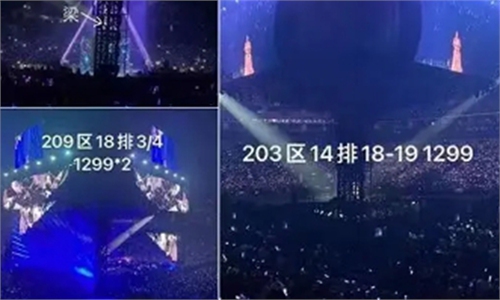ARTS / CULTURE & LEISURE
Two Chinese films lower ticket prices; flexible pricing appeals to audiences

Honey Money Phony Photo: Courtesy of Douban
The standard ticket prices for the 2D versions of the Chinese films Honey Money Phony and Hotpot Artist have been lowered to 19.9 yuan ($2.80) nationwide, according to a notice from the China Films Digital Films Development (Beijing), which is a move seeking to use lower prices to bring in more moviegoers, thereby boosting overall box-office revenue, renowned movie critic and film producer Tan Fei told the Global Times.
"Both films are comedies, and their primary target audience live in lower-tier markets," Tan said. "Lowering the price helps reduce the viewing cost for audiences in these markets, thus attracting more viewers to the theaters."
The standard price is the minimum ticket price set by the distributor for cinemas, not the price charged to the public. By adjusting the standard price for both films to 19.9 yuan, the distributors have effectively "undercut" regular pricing.
According to a previous distribution notice from ticket selling platform Maoyan, the standard price for the digital 2D version of the Honey Money Phony was originally set at 40 yuan for Beijing, Shanghai, Guangzhou and Shenzhen, while for other cities the price was set at 35 yuan per ticket.
In comparison, the new standard price for the digital 2D version has been reduced by more than half in the first four cities, and significantly lowered for other cities.
"Today, some late-night tickets for Honey Money Phony were priced as low as 19.9 yuan, and the available seats were in the front middle rows," Chen Fengping, a manager of a Beijing-based cinema, told the Global Times.
"Lower prices will likely increase the number of moviegoers during less popular times, such as late-night or weekday matinee showings. This will help improve the overall utilization of the theater," she said.

Hotpot Artist Photo: Courtesy of Douban
Movie ticket prices are market-driven, and cinemas can set their own prices. However, regardless of how cinemas price their tickets, the final price must not drop below the standard agreed upon with distributors, according to a report by the National Business Daily.Chen noted that this adjustment in pricing allows cinemas to refine their strategies, better understand audience demand, and plan for future market shifts in advance.
"The lower standard price gives cinemas more flexibility in activities such as private screenings, special events, and joint promotions, allowing them to broaden their revenue channels," she said.
In 2024, the Chinese film market reached a total box office of 42.5 billion yuan, according to the National Business Daily. This total is comparable to the box-office performance of 2015, showing a 23 percent decrease compared to 2023. The average ticket price has stayed above 40 yuan for four consecutive years, and since 2022, it has consistently been above a "high" 42 yuan.
"While the effects of lowering prices remain to be seen, such a flexible market response should be viewed positively," Tan noted.
"The more flexible the movie ticket price, the greater the room to maneuver in movie distribution, which in turn makes the film more appealing to ordinary audiences," he said.



